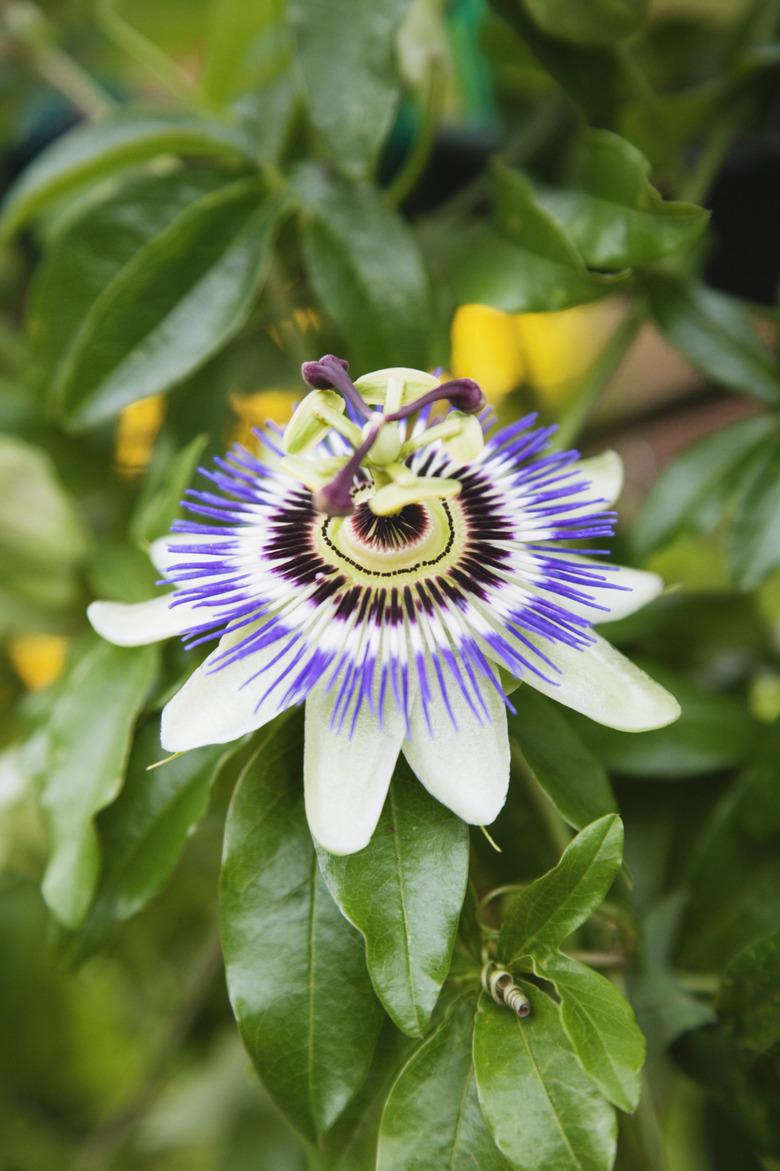Are Passion Vine Leaves Poisonous?
Passion vine (Passiflora incarnata) is a visually stunning plant from the genus Passiflora. The leaves, fruit and seeds of passiflora species have been used historically in the form of tinctures, teas, infusions and liquid extracts in homeopathic medicine to treat pain, insomnia and anxiety. However, there have been no clinical trials that have produced definitive results as to their effectiveness. There is also no research that clearly establishes the safety of ingesting passion vine leaves.
Step 1
The term "passion vine" or "passion flower" is often used to refer to Passiflora incarnata, although it is also a name given to many other plants in the passiflora genus, which contains about 400 species of plants. Passion vine is hardy in U.S. Department of Agriculture plant hardiness zones 5 through 9 and is noted for its showy flowers and edible fruit. This rapidly growing vine features dark green leaves and showy fringed flowers with white petals and purplish-pink filaments. Passion vine is prized by home gardeners for its orange-yellow egg-shaped, edible fruit.
Step 2
Chemical Content
Step 1
There are a number of chemicals that have been identified in the many different species of passion vine. Passiflora incarnate is typically considered the official passion vine plant, and it contains flavonoids, maltol, cyanogenic glycosides and alkaloids. This plant has been researched for its sedative effects, which have been attributed primarily to its alkaloid and flavonoid content.
Step 2
- The term "passion vine" or "passion flower" is often used to refer to Passiflora incarnata, although it is also a name given to many other plants in the passiflora genus, which contains about 400 species of plants.
- This plant has been researched for its sedative effects, which have been attributed primarily to its alkaloid and flavonoid content.
Toxicity and Precautions
Step 1
The California Poison Control System lists all parts of plants from the passiflora genus as having major toxicity and warns that ingestion of these plants, especially in large amounts, may cause serious effects to the heart, liver, kidneys or brain. There have been no clinical trials to assess passion vine's toxicity, but adverse effects have been documented in pregnant women due to the uterine stimulant properties of this plant's parts. Large doses of passion vine leaves or other parts can also result in depression of the central nervous system. There have been no clinical trials reported that support a safe dosage for humans of any age. Because the leaves may contain chemicals that could cause adverse effects if consumed in large enough quantities, passion vine leaves should never be used as a homeopathic treatment without consulting a medical professional first.
Possible Interactions
Step 1
Because of its sedative effects, passion vine may interact with sedative medications, such as anticonvulsants, barbiturates, benzodiazepines and tricyclic antidepressants, making their effects stronger or more intense. The chemicals in passion vine may increase the amount of time blood needs to clot, so passion vine could increase the effects of blood-thinning drugs, such as aspirin, which increases your risk of bleeding.
Step 2
- The California Poison Control System lists all parts of plants from the passiflora genus as having major toxicity and warns that ingestion of these plants, especially in large amounts, may cause serious effects to the heart, liver, kidneys or brain.
- There have been no clinical trials to assess passion vine's toxicity, but adverse effects have been documented in pregnant women due to the uterine stimulant properties of this plant's parts.
